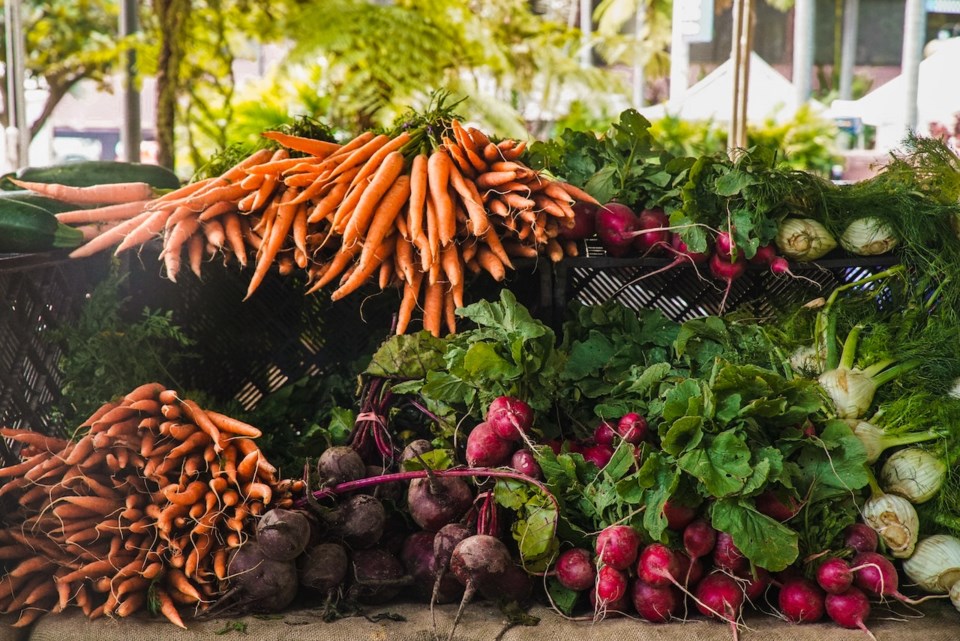In the past few days and weeks, our world has shifted. What used to be important turns out not to be essential. And, the things many of us have taken for granted, like health, human connections, and food, turn out to matter the most. Our grocery stores remain open, but our supply chains are being tested. And people are stocking up on food, leaving shelves bare. Clearly, many of us are suffering from a sense of food insecurity.
For about two and half years, Bowen Island FoodResilience (BIFS) has been focusing on what it would take to create a food system on Bowen that supports local needs, especially in times of disruption. Did you know that Canada, and B.C. in particular, imports most of the food we eat? It’s not something we tend to think about because we haven’t had any reason to worry.
In the present situation, Bowen Islanders are pulling together. The food bank is doing what it can, collecting money to buy necessities and making food drops as needed. New offers of support from businesses and individuals are coming in every day. See the sidebar for contact information.
The Facebook group “Flattening the Curve - Bowen Island” has developed an online message board for those who need help of any kind and has curated a directory of Bowen Island restaurants that are continuing to provide take out. Our grocery stores are doing an awesome job, keeping us supplied while observing physical distance and sanitation guidelines. There’s even an online coffee shop sponsored by The Bowen Health Centre Foundation.
These are the types of responses we need to think about for times of emergency. But, as a community, we also need to start thinking about protracted shortages, and the kinds of challenges that are made worse by the “slow emergency” of climate change. What can we do locally to be proactive, not just for the weeks and months ahead, but for the long term?
BIFS has been looking at potential scenarios and climate models for the region. We know that a changing climate will make any difficult situation, such as a pandemic, worse. An extended drought encourages pests, unpredictable weather patterns can adversely impact pollination and fruiting, and fire and subsequent flooding can degrade the soil that crops depend upon. These are some of the challenges to our food supply that BIFS is concerned about.
The mission of Bowen Island FoodResilience Society (BIFS) is to “help build the skills, knowledge, networks and structures needed to create a healthy, resilient, community-based food system on the island.”
So far, BIFS has held several workshops about regenerative agriculture, composting and soil health; written 19 Undercurrent articles; staffed information tables at Bowfest and last year’s Farmers Markets; produced seven large format information posters; and published two studies that can be accessed via the Municipality’s website.
In our Groundwork Report, published in fall 2019, we reported on the initiatives we found that members of the Bowen community see as needed, including water catchment programs, on-island composting, and easing regulations to enhance food production on the island.
Currently, BIFS is working on a website where these reports and other resources can be easily accessed. We have partnered with Kwantlen Polytechnic University’s (KPU) agricultural program and are pursuing grant opportunities to expand food growing information and farming opportunities on Bowen.
Whether you are interested in seed saving, beekeeping, growing your own food, canning and preserving, shared greenhouse and garden spaces, supporting on-island farmers, or some other way of building a more resilient, local food system, we hope you will engage with BIFS in the coming months as we tackle the very real challenge of preparing our island for interruptions to our food supply.
Let’s plan to help ourselves and our neighbours not just now, but in the future. If you have questions or responses to this article, please write us at: [email protected] or visit our Facebook page.
Resources:
Donate to the Food Bank
Please consider monetary donations at this time. You can e-transfer to: Sheila at [email protected].
Bowen Island Virtual Coffee Shop
The Bowen Island Health Centre Foundation holds a Zoom café from 10 a.m. to 11a.m. and 3 p.m.to 4 p.m. https://bit.ly/BowenAfternoonCoffee
Bowen Island Restaurant take-out menus
Under “Recent Files” on the Flatten the Curve – Bowen Island Help and Local Info Facebook page find the Menu PDF posted on the right side of the group’s page.
Grow Your Own?
For local tips for backyard fruit and vegetable growers, email Linda Gilkeson’s to request her free newsletter [email protected]
Read BIFS Reports
For electronic versions contact Bowen Island FoodResilience Society at: [email protected]. Toward a Resilient Food System for Bowen Island: Groundwork Executive Summary (Oct. 2019, 4 pages)
Communication & Engagement Groundwork Report (Aug. 2019, 56 pages)
Toward a Resilient Food System for Bowen Island: Agrarian Analysis (Aug. 2019, 99 pages)
Stay Home and Watch
“The Biggest Little Farm” on Netflix. Here’s how to find the trailer: youtube.com/watch?v=UfDTM4JxHl8
Note: the email address for BIFS was incorrect in the print version of this story. Its email address is [email protected].



